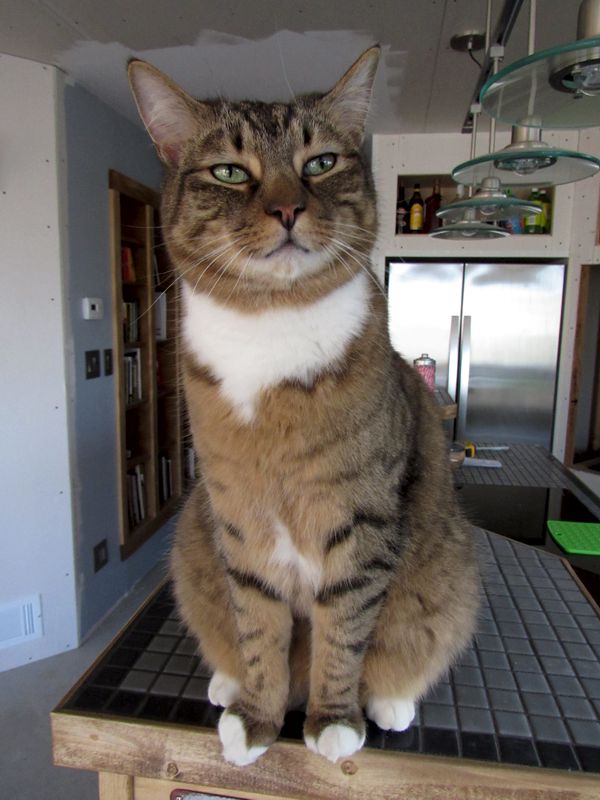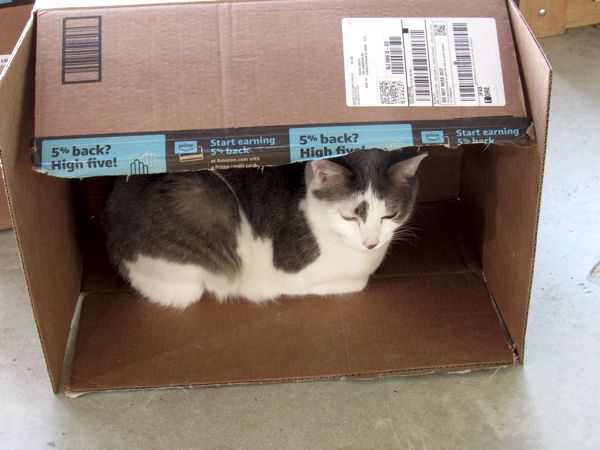
Grump Central Archive: Week of 23 February 2020

Friday, 29 February 2020
After close to a week in the hospital, I'm back home, and what a wonderful thing it is indeed to be back home, especially with my cats, who made sure I knew they were thrilled, too. The hospital stay was OK—at least as far as hospital stays go—and aside from a few glitches (owing to the fact that the place was 100% filled to capacity), the staff could not have been nicer, and I felt confident I was receiving excellent care. I had visitors every day to help keep me grounded and sane.
But the bottom line is about the same as the initial diagnosis from last week's emergency room stay: My V8 engine is now limping along on about three cylinders. There's no fixing or even improving anything; all that's left to do is keep it running as smoothly as possible under the circumstances to give me as much time as I can have—which ain't much. The doctors haven't broached that topic yet because they're not ready to commit to a time: they have loads more tests to perform and data to evaluate. But the best guess is maybe 3-4 years, assuming I'm a very good boy. One thing they can rule out: coronary blockage. Mine are as clean as a whistle.
I sit here wearing a "life vest," essentially a corset wired with sensors and electrodes to fire up a defibrillator should the system detect an anomalous heart rhythm. I get to wear the $40,000 machine 24/7 for the next several weeks, and it's about as comfortable as it sounds, although I'm sure at some point I won't notice it a much. But its constant presence is a reminder to me of what's going on in my chest, which raises anxiety that's now being treated by one of the seven new daily drugs I take. Oh, and I lost between 12 and 15 pound within two days at the hospital—all excess fluid collected around my heart and and lungs.
I've got a long list of friends, both near and far, who have provided support. Even when I was alone in the hospital, I was never alone, for I was busily swapping texts with people all day long. I'm incredibly lucky for having such a tremendous support system that's kept me emotionally propped up even during the worst of times. You know who you all are, and you know I'm eternally grateful.
One day at a time, folks, one day at a time...

Monday, 24 February 2020
What was it like receiving the diagnosis? Honestly, it was just confirmation of what I already suspected. But to see the looks on two doctors' faces when they saw the test results was still alarming, to say the least. At the first doctor's office, the technician taking the EKG printed out the results. There was a long pause, then she said, "I'm going to run another one as a backup." (She was a good liar...) The doctor took one look at the print, and her eyes flung wide open. When she composed herself, she showed it to me: some of the lines literally went off the chart. After explaining to me what it meant, she immediately ordered a wheelchair to have me taken to the emergency room across the street.
Round two was much like the first, but longer and with more tests. Another EKG. Chest X-rays. And a full panel of blood work. The results were all back in minutes. Meanwhile, the monitor was displaying my vitals: after spiking at 212/164, my blood pressure finally leveled off at 186/134, with a pulse rate of 115. The doctor whacked me with a triple-dose of beta-blocker, a vasodilator, and a diuretic; a half-hour later, my BP had inched down to 164/112, but would go no further. When the doctor gave me the grim diagnosis, it kicked back up to 186/134. Naturally they wanted to admit me immediately; naturally I said no. He advised me that I could die at any time—that set me back, but I still said no. I wanted to make arrangements for the house and cats, as well as square away a few other items, before committing myself to several days in a hospital bed. Besides, with the crushing emotional weight of the diagnosis, I needed to be home, where I could decompress. I was otherwise at risk of a full-blown panic attack on top of out-of-control blood pressure and lungs full of fluid.
Even suspecting the outcome in advance, the reality of it is just now sinking in. I knew it was bad, but I had no idea just how bad; the haunting look on the first doctor's face will stay with me. It all has me asking questions I'd not expected to be asking at 65. Friends keep saying "You're too young." But when I look at my life objectively, I realize I've lived a remarkably full one, and accomplished things I'd never expected to, such as building a home; the rest is just a downhill coast. If I don't live long enough to do those last few things I'd wanted to do, it won't bother me: mercifully, the dead have no regrets.

Sunday, 23 February 2020
A number of friends have been urging me to get a heart transplant. This is not an option for me. First and foremost: I couldn't afford one. Even with the best insurance—assuming I could afford that—my out-of-pocket cost would be around $30,000 for the procedure (which averages $1.3 million pre-insurance), plus between three and four thousand I'd have to pay for maintenance medications per month for the rest of my days, not including countless follow-up visits. Most transplant centers require proof of sufficient funds before they'd even consider doing it. Second, survivability. Statistically, the survival rate for heart transplant patients isn't much better than what mine is right now. At most I might get another few years, maybe even five or six if I'm lucky, but then there's a third point: quality of life. A close friend of mine says he knew four people who had heart transplants; his conclusion was, "You're never the same afterward." And he meant that in a negative sense: the psychological effects can be profound, and often result in the person becoming "strange." A fourth factor is age: people over 65 aren't always accepted for the procedure, especially if they have other health issues, and I have a bunch. Finally, it's down to what I want, as opposed to what everyone else wants. And I want to be me and whole right up to the bitter end. The thought of undergoing the procedure is repugnant: I'd rather have a shorter life than be chopped apart and turned into a patchwork pill-guzzling machine—typically up to 30 medications a day—just to have a few more years of life (and fatten a bunch of doctors' wallets). To me, that's not living. It's just surviving.